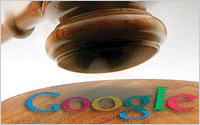Google Wins Key Ruling In AdWords Lawsuit
- by Wendy Davis @wendyndavis, October 17, 2011
 In a significant victory for Google, a judge has ruled that the company won't have to face a class-action lawsuit about its policy of allowing trademarks to trigger
search ads.
In a significant victory for Google, a judge has ruled that the company won't have to face a class-action lawsuit about its policy of allowing trademarks to trigger
search ads.
U.S. District Court Judge John Ward ruled that the allegations brought against Google by three separate marketers -- that had hoped to represent a broad array of marketers with trademark complaints against the search engine -- require individualized decisions. “Plaintiffs’ common contention ... is not capable of classwide resolution,” the decision states.
The opinion was authored by U.S. Magistrate Charles Everingham in the Eastern District of Texas, and quietly adopted by Ward two weeks ago. The companies who are suing -- John Beck Amazing Profits, Firepond (FPX), and The Rodney A. Hamilton Living Trust -- argue that Google should not have allowed their trademarks to trigger pay-per-click ads for other companies.
The marketers argue that consumers will be confused when they search for a particular company and its rivals appear in the results. But Everingham ruled that questions about whether consumers are confused are too specific to be determined in a class-action.
“Even if the court were to conclude that Google’s policy results in initial interest confusion with regard to, for example, FPX’s or Rodney Hamilton’s trademark, that does not necessarily mean that Google’s policy results in initial interest confusion with regard to the other putative class members’ trademarks,” Everingham wrote.
The ruling allows the three plaintiffs to continue with their lawsuits individually, but the outcome of those actions will only affect the companies who are suing and not all businesses with trademark complaints regarding AdWords.
Plus, the lawyers representing the companies that are suing aren't likely to recover the kinds of fees that are available to class-action attorneys. Google has faced several lawsuits about this issue since 2004, when the search engine began allowing companies to use their rivals' trademarks to trigger keyword ads. So far, the search giant has prevailed in all of the major contested lawsuits about the practice.
Most recently, last year U.S. District Court Judge Gerald Bruce Lee in Alexandria, Va. awarded summary judgment to Google in a lawsuit brought by Rosetta Stone. The language instruction company is appealing that decision to the 4th Circuit Court of Appeals. Google also defeated insurance company Geico after a trial in 2004.
In that case, U.S. District Court Judge Leonie Brinkema in Alexandria, Va. ruled that Geico didn't prove that consumers were confused when they typed the word Geico into the query box and Google returned results for other insurance sellers. Yet another high-profile lawsuit against Google, brought by computer repair shop Rescuecom, ended last year with the repair company dropping the matter.



My take on this is that companies continue to look for someone to blame for declining sales, and are getting bad advice from the wrong people who only stand to gain, win or lose.
Before being talked into legal action that you are going to have to foot the bill for if you lose, do some research and get a "second opinion". Ask your law firm if they will take the case on contingency and see what their reaction is.
Of course these suits are going to fail when correctly analyzed. Just because someone searches for a trademarked name doesn't mean they are going to be confused as a result of that action. They MAY be confused by the RESUTS they see, then the guilty party is the one that places the ad, not the one that allows the ad to be seen.
Expecting Google to decide which ads may be confusing to a consumer is expecting them to be god-like, which they are not and I hope they never become. :-)